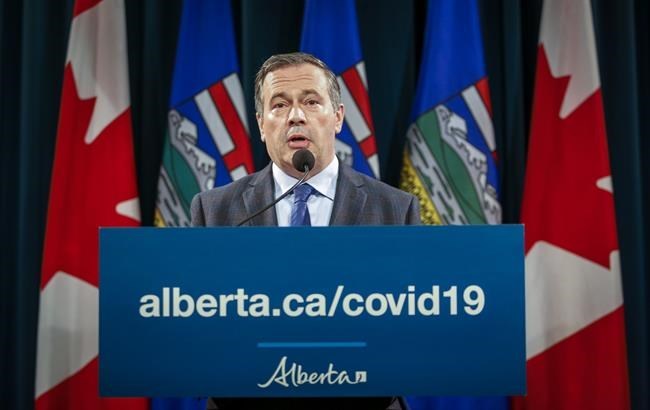Alberta businessgroups say a new program the province has launched to fight COVID-19 has been short on details while giving business owners little notice to make dramatic changes to their operations.
The Calgary Chamber of Commerce and Canadian Federation of Independent Business said Thursday that their members have uncovered plenty of confusion as they scramble to make sense of the restriction exemption program Alberta Premier Jason Kenney announced Wednesday.
"Yesterday’s announcement prompted more questions than answers for our business community," said Deborah Yedlin, the chamber's president and chief executive, in a statement.
"Answers and clarity are needed urgently."
The program Yedlin was referring to is meant to force people in Alberta to show proof of vaccination to enter non-essential businesses, including select stores, restaurants, nightclubs, casinos, concerts and libraries as of Sept. 20.
Businesses can opt out of the program but must operate at reduced capacity and with distancing rules or restrictions. For example, restaurants not in the program are limited to outdoor dining with no more than six people at a table.
Just after the program was announced, Annie Dormuth, the CFIB's provincial affairs director for Alberta, was already hearing from owners confused about if they will have to apply to use the program or to opt out of it.
Others were concerned the government didn't offer guidance or training to staff around how to check if vaccination proof is fraudulent or deal with unruly patrons who disagree with the measures.
Some even lamented a lack of time to reorient their businesses and retrain staff for the new policies because the program has more exemptions than initiatives in other provinces and was announced roughly four days before it will go into effect.
"In the province of B.C., they were given a week and they were given support in the form of posters and guidance documents and here, we are three-and-a-half days away from this now and there's not a whole lot of guidance being provided to business owners right now," said Dormuth.
The lack of details is the latest challenge for small business owners who have spent much of the pandemic dealing with lower sales and fewer patrons.
CFIB estimates that small businesses in Canada now have debt totalling $139 billion due to COVID-19, a slight increase from the estimated $135 billion in February of this year.
Three-quarters of small businesses that took on debt believe it will take more than a year to repay. In the hospitality sector alone, 87 per cent believe it will take longer than two years to deal with their debts.
Despite the pandemic challenges, Andrew Cowan had no qualms about requiring guests to show proof of vaccination before they visit Northern Chicken, the Edmonton restaurant he co-owns.
"Between my business partner and I, there were chats about how maybe we were going to do a vaccine passport ourselves, but the government is doing it now, so we don't have to worry," he said.
Cowan believes the changes won't take much effort for his restaurant to implement because it doesn't seat too many people and his staff have become accustomed to adapting to changes quickly after more than a year of pandemic regulations.
The biggest task stemming from the new program, he said, is training staff to check vaccine statuses and deal with any guests that try to buck the new regulations.
"It was a pretty muddy announcement, but we've got it pretty much figured out now and it doesn't really change much from our perspective," Cowan said.
"We were already being careful and trying to keep everything socially distanced in the restaurant already."
The program that his restaurant and others are now adjusting to was introduced because a wave of new COVID-19 cases has overwhelmed hospitals.
Seeing droves of unvaccinated patients, health-care workers intensified their calls for more stringent safety measures amid polls showing support for vaccination passports in recent months, but Kenney refused to heed their advice until this week.
"Jason Kenney has demonstrated himself to be a skilled contortionist, bending himself virtually into a pretzel in order to appease a small fringe but vocal group of individuals who are opposed to vaccination," University of Alberta assistant professor of infectious diseases, Dr. Ilan Schwartz, said at a Wednesday press conference held by Protect Our Province.
The organization comprised of health-care workers has long urged the government to take the pandemic and the fourth wave more seriously by retaining basic measures like isolation for people who test positive for COVID-19.
Despite Kenney finally edging toward more measures, the group remains disappointed with his new program and its lack of clarity, and fears it will do little to quell the virus.
Dr. Schwatz said, "We're left with a hodgepodge of measures that are confusing, and consequently, they're likely ineffectual."
This report by The Canadian Press was first published Sept. 16, 2021.
Tara Deschamps, The Canadian Press
Note to readers: This is a corrected story. A previous version said restaurants that opt out of the vaccine program are limited to no more than six people at a table, but that is only for outdoor dining.



